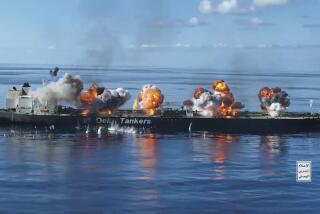Iran Will Attack American Ships, Arab Nations That Aid U.S., Rafsanjani Warns
- Share via
DUBAI, United Arab Emirates — Hashemi Rafsanjani, the Speaker of the Iranian Parliament, has threatened that Iran will attack U.S. shipping in the Persian Gulf and any Arab states in the region that provide assistance to U.S. military forces, the official news agency reported Wednesday.
Rafsanjani’s statements, published by the official Islamic Republic News Agency, appeared to reflect an escalation of Iran’s propaganda efforts to get the United States to back away from its plans to provide naval escorts to 11 “reflagged” Kuwaiti tankers beginning next week.
The reports of the threats came as Kuwait formally asked Britain to join the reflagging effort. The government of Prime Minister Margaret Thatcher responded that re-registering Kuwaiti ships as British would be purely a commercial matter and would not guarantee protection for the ships from the three Royal Navy warships in the gulf.
Seeking a British Role
The rejection appeared as much directed at the United States as at Kuwait, since the Reagan Administration had campaigned for the British to join in protecting Kuwaiti ships.
The latest Iranian warnings to the United States were issued Tuesday at a ceremony in Tehran honoring commanders of the Islamic Revolutionary Guards Corps, whose force of high-speed gunboats has mounted a number of hit-and-run attacks on shipping in the gulf in recent days. Last week, a U.S.-operated tanker, the Peconic, was hit by rocket-propelled grenades from such an Iranian gunboat but suffered only minor damage.
When the U.S. ships enter the gulf, Rafsanjani was quoted as saying, “we would point part of our artillery at the Yankees and take American captives with their hands on their heads to camps with humiliation.”
Rafsanjani, who is the Iranian leader that Reagan Administration officials dealt with in their failed attempt to trade arms for the freedom of American hostages held by pro-Iranian groups in Lebanon, appeared to be evoking the humiliation that the United States suffered during the 444-day captivity of U.S. Embassy diplomats in Tehran who were seized by Iranian militants.
In his statement, he also warned Arab states, which tend to support Iraq in the war with non-Arab Iran, to stay out of the fray and not provide assistance to U.S. ships.
“If you put your bases or ports at the disposal of the U.S., we would capture them,” Rafsanjani said, adding that Iran would regard them as having been captured from the United States.
This warning appeared aimed mainly at Bahrain, which provides port facilities to U.S. Navy ships in the gulf, which are known collectively as the Mideast Force.
The news agency also quoted Ali Shamkhani, deputy commander of the paramilitary Revolutionary Guards, as saying that the Iranians would attack the U.S. warships.
“We would try as much as possible not to destroy them but to seize them intact to strengthen Iran’s naval potential,” he was quoted as saying.
Rafsanjani said Iran was not in favor of spreading the war but would be prepared for a showdown “if the enemy got crazy.”
The intensity of the propaganda emanating from Iran appears to indicate a rising level of anxiety in official circles there about the consequences of the U.S. escort plan.
Beginning next week, a 401,000-ton Kuwaiti supertanker, one of the world’s largest ships, will ferry oil from an offshore loading platform off Kuwait to the Gulf of Oman under the protection of U.S. warships.
On Tuesday, Rep. Les Aspin (D-Wis), chairman of the House Armed Services Committee, disclosed to reporters that the U.S. Navy plans to begin the escort duty next Wednesday.
The Iranians have been attacking Kuwaiti shipping because Kuwait supports Iraq in the almost seven-year-old war between Iraq and Iran, and the Tehran government hopes that Kuwait will use its leverage on Baghdad to bring about an end to Iraqi attacks on Iranian oil exports in the gulf.
Iraqi planes were in action again Wednesday, bombing an Iranian offshore oil production facility near the Strait of Hormuz at the mouth of the gulf.
The official Iraqi News Agency said the air raid on the Rostam oil field, a distance of 370 miles, was planned to “reiterate to the Iranian enemy that no matter how long the war continues, we are determined to deprive them of every source of revenue.”
Usually, Iran attacks shipping bound from Kuwait after Iraqi raids.
Kuwait has been making broad hints that it would seek to register some of its tanker fleet in European countries, particularly in Britain, to augment the reflagging operation with the United States.
3 Tankers From Gibraltar
By doing so, the Kuwaitis evidently hope to “internationalize” the conflict between Iran and Iraq to the point that the big powers force an end to the fighting.
In addition to the United States, the Soviet Union has provided Kuwait with three tankers on charter, as well as sending naval vessels into the gulf.
Kuwait has already obtained three tankers on charter from Gibraltar, whose status as a British colony evidently qualifies the vessels for protection by Royal Navy escort.
The Kuwaiti Foreign Ministry made an official approach to the British ambassador in Kuwait, Peter Hinchcliffe, requesting that Britain reflag Kuwaiti vessels directly with the Union Jack.
“The ambassador told him that re-registering was not a matter for the British government,” the Foreign Ministry spokesman said. “Under British laws, it is done commercially. They must find a commercial company to re-register the ship.”
European officials, as well as other gulf countries, have expressed skepticism about the reflagging operation, saying the United States cannot guard against suicide attacks from Iran or against mines. A number of mines have been found in the approaches to Kuwait’s main oil port, and Iran is suspected of laying them.
More to Read
Sign up for Essential California
The most important California stories and recommendations in your inbox every morning.
You may occasionally receive promotional content from the Los Angeles Times.













